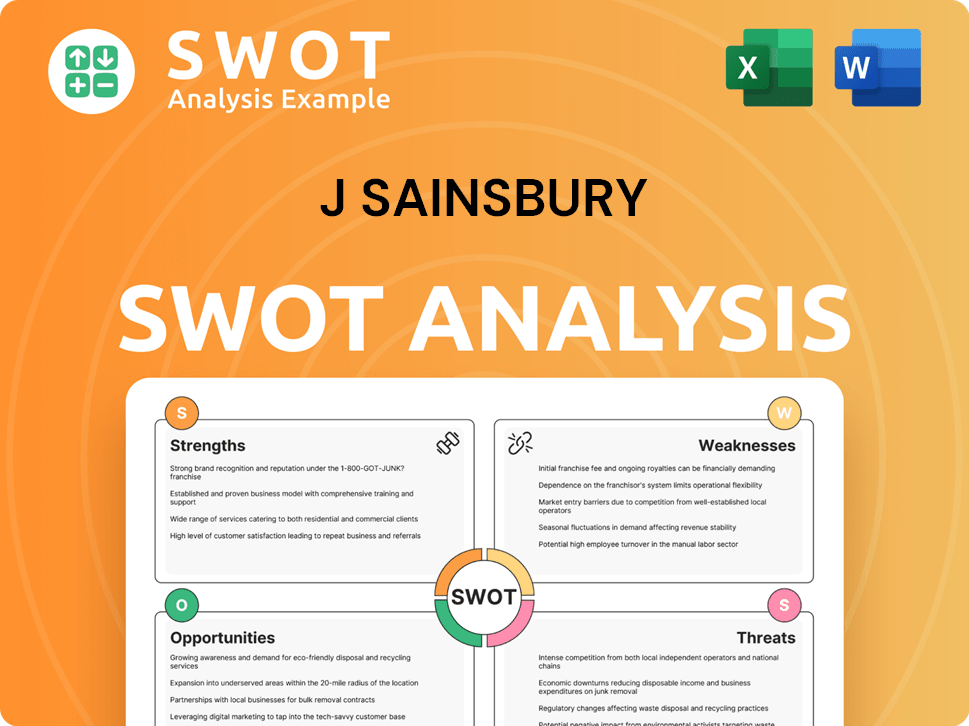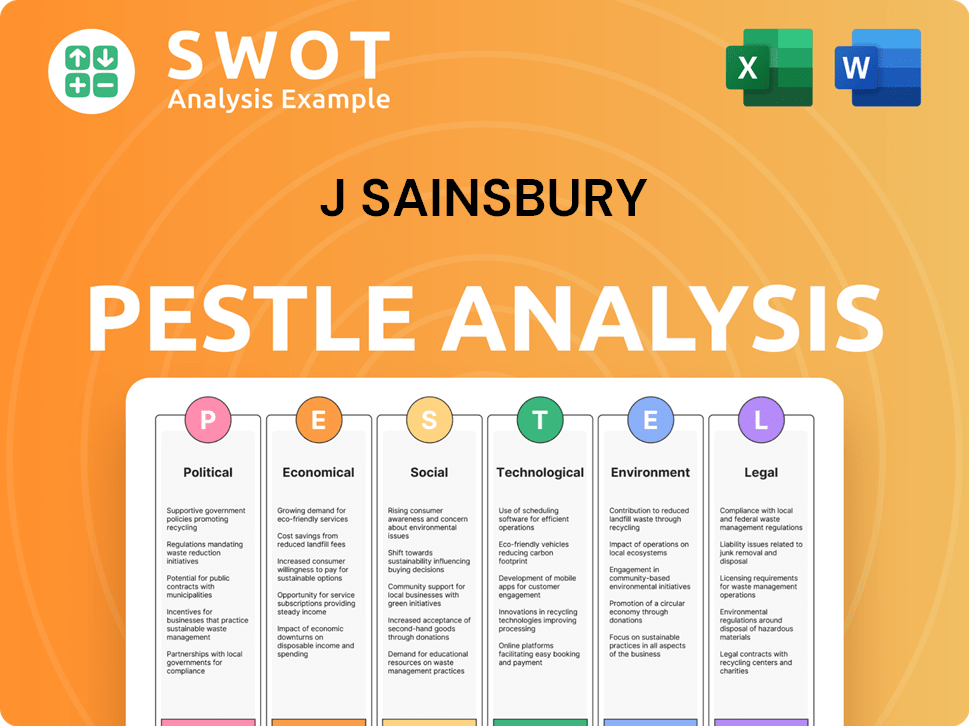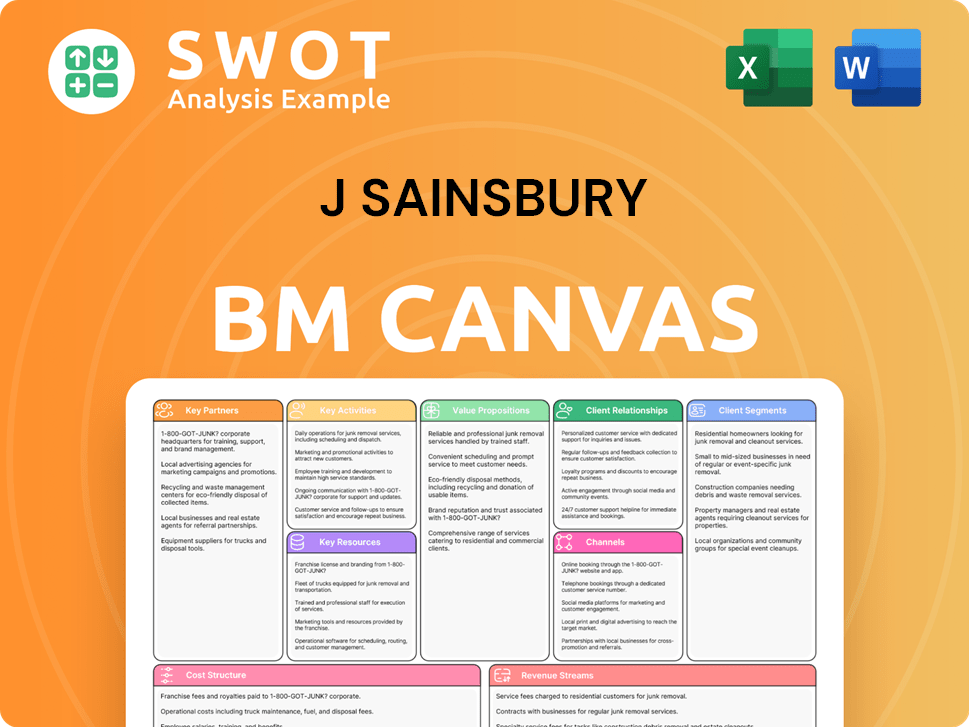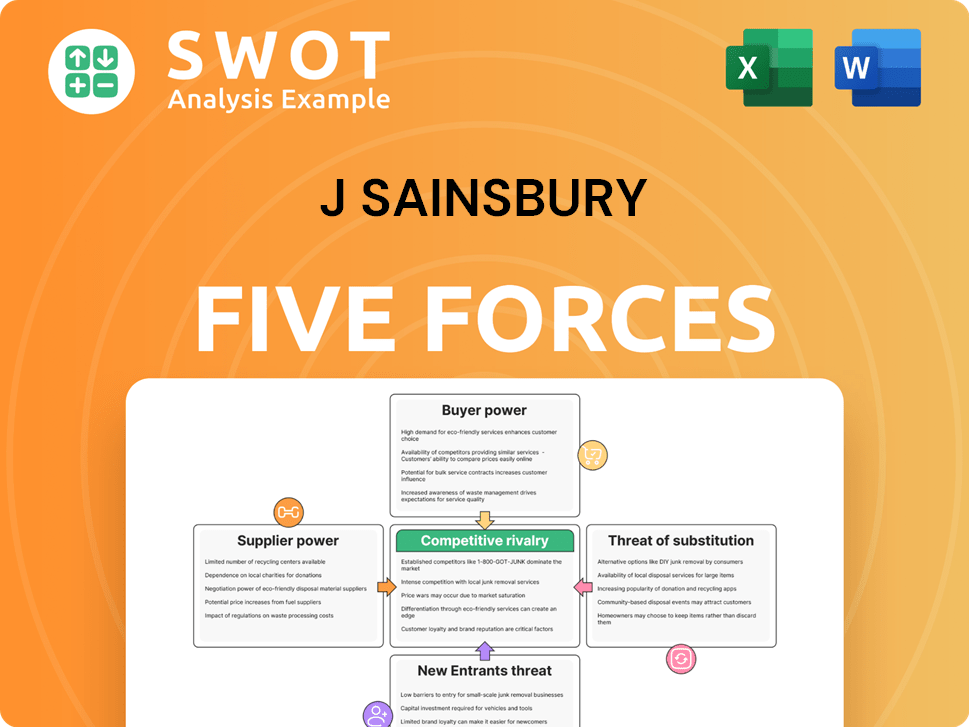J Sainsbury Bundle
What Drives J Sainsbury Company's Strategy?
Every successful company hinges on a strong foundation: its mission, vision, and core values. These elements are the compass guiding a company's journey, and for J Sainsbury plc, they are particularly crucial in the competitive retail landscape.

Understanding the J Sainsbury SWOT Analysis is key to grasping the company's positioning, but it's equally important to delve into its core principles. This analysis explores the Sainsbury's mission, Sainsbury's vision, and Sainsbury's core values, revealing how these principles shape its operations and strategic direction. Learn about the Sainsbury's values and the Company mission statement to understand the company's commitment to its stakeholders.
Key Takeaways
- Sainsbury's core principles center on customer focus, value, and quality.
- 'Next Level Sainsbury's' strategy aims to make good food joyful, accessible, and affordable.
- Sustainability and ethical practices are increasingly central to Sainsbury's identity.
- These principles differentiate Sainsbury's and build stakeholder trust.
- Digital transformation and sustainable sourcing are key for future success.
Mission: What is J Sainsbury Mission Statement?
Sainsbury's mission is 'to make good food joyful, accessible and affordable for everyone, every day.'
Let's delve into the core of J Sainsbury company, specifically its mission statement. Understanding the Sainsbury's mission is crucial for grasping the company's strategic direction and its commitment to its customers. This mission statement serves as the foundation upon which Sainsbury's builds its operations and brand identity.
The Company mission statement is a concise declaration of purpose. It encapsulates the essence of what Sainsbury's aims to achieve. The statement directly addresses the needs and desires of its target audience.
Sainsbury's mission is profoundly customer-centric. It emphasizes providing value and a positive experience. This focus is evident in their strategies and initiatives.
The mission highlights key value propositions: quality, joy, accessibility, and affordability. These elements work together to create a compelling offer for customers. This is how Sainsbury's values are put into practice.
The mission's principles are reflected in Sainsbury's operational strategies. Investments in pricing, sourcing, and online services demonstrate their commitment. This commitment is also reflected in the Owners & Shareholders of J Sainsbury.
Sainsbury's has invested significantly in lowering prices, committing £1 billion over recent years to enhance their value proposition. This is a direct reflection of their mission.
Sainsbury's sources a significant portion of its fresh food from UK farms, with 72% as of 2023. The expansion of their online shopping and convenience stores also underscores their commitment to accessibility. These actions are directly linked to their Sainsbury's mission.
The Sainsbury's mission statement is a clear articulation of the company's purpose. It's a customer-focused statement that guides its operations and strategic decisions. The mission's emphasis on quality, value, and accessibility underscores Sainsbury's commitment to meeting the needs of its customers every day. Understanding this mission is key to appreciating the company's overall strategy and its place in the competitive food retail market. The mission statement is a cornerstone of the company's identity, influencing everything from product sourcing to customer service. This is a reflection of Sainsbury's vision and its core values.
J Sainsbury SWOT Analysis
- Complete SWOT Breakdown
- Fully Customizable
- Editable in Excel & Word
- Professional Formatting
- Investor-Ready Format

Vision: What is J Sainsbury Vision Statement?
Sainsbury's vision, as articulated through its 'Next Level Sainsbury's' strategy, is to become the 'First choice for food' and to lead in creating a more sustainable food system in the UK.
Let's delve into the vision of J Sainsbury company.
While a formal Sainsbury's vision statement isn't always explicitly presented, the 'Next Level Sainsbury's' strategy serves as its guiding light. This strategy, launched in February 2024, encapsulates the company's aspirations for the future.
The core of Sainsbury's vision revolves around becoming the "First choice for food." This ambition underscores the company's commitment to attracting more customers to its food offerings. This includes a focus on quality, range, and value. In 2023, Sainsbury's reported food sales of £19.3 billion, a testament to its strength in this area.
A crucial element of Sainsbury's vision for the future is its commitment to sustainability. The company aims to play a leading role in building a more sustainable food system. This includes initiatives to reduce carbon emissions, promote sustainable sourcing, and minimize food waste. Sainsbury's has set ambitious targets, including becoming Net Zero in its own operations by 2040.
The vision also encompasses the transformation of the Argos brand. Sainsbury's intends to "unleash and transform" Argos, aligning it with evolving consumer needs and preferences. This involves integrating Argos more closely with Sainsbury's stores and online platforms. Argos contributed £3.8 billion in revenue to the group in 2023.
The scope of Sainsbury's mission is primarily focused on strengthening its core food business and enhancing its complementary offerings. This strategic direction appears realistic, building upon its existing strengths and market position. The company's focus on increasing food space in stores and expanding its convenience format demonstrates a clear path towards achieving its vision. For a deeper understanding of their customer base, explore the Target Market of J Sainsbury.
The emphasis on becoming the 'First choice for food' and leading in sustainability reflects both market leadership ambitions and a response to evolving consumer priorities. Consumers are increasingly focused on health, ethical sourcing, and environmental impact. Sainsbury's is adapting to these trends by expanding its range of plant-based products and reducing plastic packaging. In 2023, Sainsbury's saw a 14% increase in sales of plant-based products.
Proceed writing about the vision of the company.
J Sainsbury PESTLE Analysis
- Covers All 6 PESTLE Categories
- No Research Needed – Save Hours of Work
- Built by Experts, Trusted by Consultants
- Instant Download, Ready to Use
- 100% Editable, Fully Customizable

Values: What is J Sainsbury Core Values Statement?
Understanding the core values of J Sainsbury company is crucial to grasping its operational philosophy and its approach to the market. These values, though not explicitly presented in a numbered list, are deeply ingrained in Sainsbury's operations and shape its interactions with customers, colleagues, and the wider community.
Customer satisfaction is a cornerstone of Sainsbury's strategy, driving loyalty and repeat business. This commitment is reflected in initiatives like enhanced online shopping experiences and the Nectar loyalty program, which boasts nearly 18 million digital collectors, offering personalized value and offers. As of 2024, Sainsbury's recorded a customer satisfaction score of 85%, underscoring the effectiveness of this customer-centric approach.
Sainsbury's places a high value on providing high-quality products, which is evident in its wide range of offerings, including fresh produce and own-brand items. In 2022, own-brand products represented approximately 24% of total sales, highlighting the importance of quality in its product portfolio. Furthermore, their commitment is demonstrated by sourcing 72% of fresh food from UK farms.
Sainsbury's is dedicated to providing fair prices to its customers through competitive pricing strategies and campaigns. The 'Price Lock' campaign, which has stabilized prices on over 1,000 essential items, exemplifies this commitment. Sainsbury's has invested £1 billion in lowering prices in recent years, demonstrating its dedication to affordability.
Sustainability and ethical practices are integral to Sainsbury's operations. They aim to be carbon neutral in their own operations by 2040 and have already reduced emissions significantly. Initiatives include reducing plastic usage (25% decrease in recent years) and donating food surplus to charities (£12 million in 2023). Their commitment to sustainable sourcing, particularly being deforestation and conversion-free in own-brand supply chains by 2025, is another key aspect.
These core values, which define the Mission, Vision & Core Values of J Sainsbury, collectively shape Sainsbury's corporate identity. These principles guide its strategic decisions and underscore its commitment to long-term sustainability and stakeholder value. The next chapter will explore how the company mission statement and vision influence its strategic decisions.
How Mission & Vision Influence J Sainsbury Business?
The mission, vision, and core values of J Sainsbury Company are not just aspirational statements; they are the bedrock upon which its strategic decisions are built. These principles guide every aspect of the business, from daily operations to long-term planning, ensuring alignment with its core purpose.
Sainsbury's mission and strategic outcomes directly influence its business strategy, notably the 'Next Level Sainsbury's' plan. This plan, driven by the purpose of making good food joyful, accessible, and affordable, has four key outcomes.
- First choice for food
- Loyalty everyone loves
- More Argos, more often
- Save and invest to win
A prime example of this influence is the significant investment in lowering prices, totaling £1 billion. This strategic move enhances the value perception of Sainsbury's food offerings, attracting a broader customer base. Furthermore, the expansion of food space within existing stores and the acquisition of new sites for conversion into supermarkets underscore the commitment to being the 'First choice for food' and increasing accessibility for customers.
The Nectar loyalty program and its personalized capabilities are central to the 'Loyalty everyone loves' outcome. This focus on customer retention has driven significant revenue through Nectar360, demonstrating the power of customer-centric strategies. Sainsbury's has seen an 18% increase in primary customers over the last four years, highlighting the success of this approach.
The 'Save and invest to win' outcome is supported by a target of £1 billion in cost savings by March 2027. These savings are earmarked for reinvestment in the business, further fueling growth and innovation. This strategic financial discipline is crucial for long-term sustainability.
These strategic choices have led to measurable success, including gaining grocery market share. Sainsbury's has achieved seven consecutive quarters of volume growth ahead of the market, a testament to the effectiveness of its mission-driven approach. This growth reflects a robust understanding of customer needs and market dynamics.
These principles shape day-to-day operations by prioritizing customer service, product availability, and value. Long-term planning is guided by ambitions for sustainable growth, digital transformation, and enhancing their multi-channel offering. These ambitions are directly rooted in Sainsbury's mission, vision, and values.
Understanding the evolution of Sainsbury's mission, vision, and core values provides valuable context. To delve deeper into the company's journey, consider exploring Brief History of J Sainsbury. This historical perspective illuminates how the company's principles have adapted and evolved over time, shaping its current strategies and future direction.
Sainsbury's mission and vision are not static; they are dynamic forces that drive continuous improvement and adaptation. In the next chapter, we will explore the Core Improvements to Company's Mission and Vision, examining how Sainsbury's refines its purpose and values to meet the evolving needs of its customers and the market.
J Sainsbury Business Model Canvas
- Complete 9-Block Business Model Canvas
- Effortlessly Communicate Your Business Strategy
- Investor-Ready BMC Format
- 100% Editable and Customizable
- Clear and Structured Layout

What Are Mission & Vision Improvements?
While Sainsbury's has a solid foundation, refining its mission, vision, and core values can enhance its adaptability and appeal in today's dynamic market. These improvements aim to strengthen Sainsbury's position as a forward-thinking and responsible retailer.
Explicitly defining and widely communicating 4-6 core values would provide a clear and easily understood framework for all stakeholders. This could include values such as "Customer Focus," "Sustainability," "Innovation," and "Integrity," which would reinforce the company's commitment to its principles. This is crucial as a recent survey indicated that 70% of consumers prefer to buy from companies with strong values.
Strengthening the focus on technological innovation within the Sainsbury's mission statement is vital. This includes explicitly mentioning the use of technology for a seamless customer experience, operational efficiency, and data-driven decision-making. This is particularly relevant given the rapid growth of online grocery shopping, which saw a 12% increase in the last year.
Acknowledging the global interconnectedness of supply chains and the broader impact of sustainability efforts would resonate with an increasingly globally aware consumer base. This could involve incorporating language that highlights the company's commitment to ethical sourcing and its role in global sustainability initiatives. This aligns with the growing consumer demand for transparency, with 65% of consumers wanting to know where their products come from.
Refining the mission and vision to specifically address the circular economy, ethical AI usage, and promoting healthier and more sustainable diets would showcase a forward-thinking approach. This includes clear product labeling and incentives to encourage sustainable choices. For further insights into Sainsbury's operations, consider reading about the Revenue Streams & Business Model of J Sainsbury.
How Does J Sainsbury Implement Corporate Strategy?
Implementing a company's mission, vision, and core values is crucial for translating strategic intent into tangible actions and outcomes. This chapter examines how J Sainsbury company brings its statements to life through various initiatives and practices.
The 'Next Level Sainsbury's' strategy serves as the primary vehicle for implementing the Sainsbury's mission and achieving its strategic outcomes. This strategy provides a clear roadmap with specific commitments and measurable targets, ensuring that the company's goals are actively pursued across all operations.
- Expanding Food Space and Product Range: To fulfill its commitment to being "First choice for food," Sainsbury's has focused on expanding food space in stores and introducing a wide array of new products. For example, some stores have seen the introduction of over 1,000 new products, enhancing the variety and appeal of their food offerings.
- Focus on Quality and Value: Sainsbury's emphasizes the quality and value of its food range to resonate with customer preferences and market demands. This includes sourcing high-quality ingredients, optimizing supply chains, and implementing competitive pricing strategies.
- Nectar Program and Customer Loyalty: The Nectar program is a key initiative for the "Loyalty everyone loves" outcome. It offers personalized offers and rewards, driving customer engagement and loyalty. Nectar360, a data-driven platform, further enhances this by leveraging customer insights to tailor promotions and improve the shopping experience.
Leadership plays a pivotal role in reinforcing the Sainsbury's mission, Sainsbury's vision, and Sainsbury's core values. CEO Simon Roberts actively communicates the 'Next Level' strategy and its purpose to stakeholders, ensuring alignment and understanding across the organization. This top-down approach helps embed the company's principles into its culture and operations.
Sainsbury's communicates its strategy and outcomes through various channels, including annual reports, trading statements, and corporate announcements. These reports provide detailed insights into the company's performance, progress against targets, and future plans, keeping stakeholders informed and engaged. This transparent approach builds trust and reinforces the company's commitment to its stated principles.
Sainsbury's demonstrates alignment between its stated Sainsbury's values and practices through concrete actions. The company's significant investment in lowering prices directly reflects the 'affordable' aspect of its purpose, making good food accessible to a wider customer base. For example, in 2024, Sainsbury's invested significantly in lowering prices on essential items to support customers during the cost-of-living crisis. This commitment to affordability is a key element of their Company mission statement.
Sustainability initiatives, such as carbon emission reduction targets and sustainable sourcing commitments, demonstrate the practical application of their sustainability value. Sainsbury's is committed to reducing its environmental impact and promoting ethical practices throughout its supply chain. Their 'Plan for Better' framework integrates sustainability and social responsibility across operations. For further insights into their strategic direction, you can explore the Growth Strategy of J Sainsbury.
J Sainsbury Porter's Five Forces Analysis
- Covers All 5 Competitive Forces in Detail
- Structured for Consultants, Students, and Founders
- 100% Editable in Microsoft Word & Excel
- Instant Digital Download – Use Immediately
- Compatible with Mac & PC – Fully Unlocked

Related Blogs
- What are Mission Vision & Core Values of J Sainsbury Company?
- What is Competitive Landscape of J Sainsbury Company?
- What is Growth Strategy and Future Prospects of J Sainsbury Company?
- How Does J Sainsbury Company Work?
- What is Sales and Marketing Strategy of J Sainsbury Company?
- Who Owns J Sainsbury Company?
- What is Customer Demographics and Target Market of J Sainsbury Company?
Disclaimer
All information, articles, and product details provided on this website are for general informational and educational purposes only. We do not claim any ownership over, nor do we intend to infringe upon, any trademarks, copyrights, logos, brand names, or other intellectual property mentioned or depicted on this site. Such intellectual property remains the property of its respective owners, and any references here are made solely for identification or informational purposes, without implying any affiliation, endorsement, or partnership.
We make no representations or warranties, express or implied, regarding the accuracy, completeness, or suitability of any content or products presented. Nothing on this website should be construed as legal, tax, investment, financial, medical, or other professional advice. In addition, no part of this site—including articles or product references—constitutes a solicitation, recommendation, endorsement, advertisement, or offer to buy or sell any securities, franchises, or other financial instruments, particularly in jurisdictions where such activity would be unlawful.
All content is of a general nature and may not address the specific circumstances of any individual or entity. It is not a substitute for professional advice or services. Any actions you take based on the information provided here are strictly at your own risk. You accept full responsibility for any decisions or outcomes arising from your use of this website and agree to release us from any liability in connection with your use of, or reliance upon, the content or products found herein.